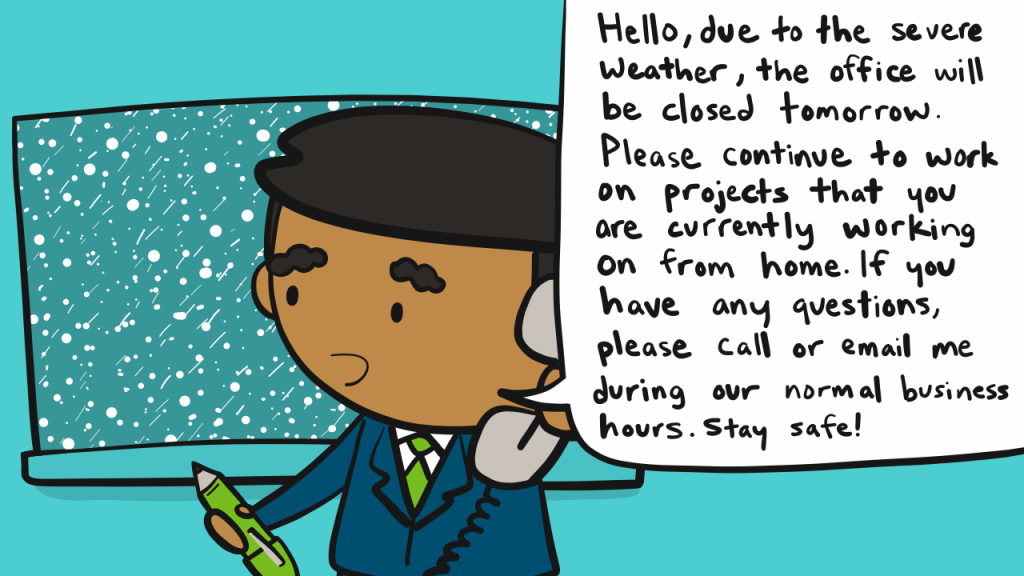Whether you work in the Midwest, on the East Coast, the West Coast or the South, severe weather is a constant across the country. Hurricanes, floods, tornadoes, winter storms, black ice, and plunging temperatures into the negatives, you name it – whatever weather heads your way, you must be prepared.
In January, a large portion of the country experienced historic low temperatures. In much of the Midwest, it was colder than in Antarctica. From North Dakota to Michigan, a polar vortex swept through, causing temperatures as low as minus 56 degrees. Schools and businesses closed because it was too dangerous to be outdoors.
Office workers across the country, however, have other elements to worry about. For example, earlier this year, areas of California experienced heavy rainfall and flash floods, impacting major freeways and thereby commute time. Over the years, Atlanta, a city where snow is rather unlikely, has seen bizarre bouts of snow, resulting in city-wide closures and panic.
What does a company do for its employees when there is inclement weather? And how should a company best communicate its severe weather policy to employees?
The following outlines the steps a company should take to keep its employees safe and informed during inclement weather incidents:
-
Develop a severe weather policy
Before the flurries arrive and temperatures drop, make sure there is a policy in place that employees can reference. For example, how will you notify employees the day of the storm if severe weather causes an office closure? Broadcast email, text message, or phone call? Or all the above? In addition, will employees get compensated the same way?
-
Alert staff if the office will be closed
Instead of wondering whether they should “brave” the dangerous roads, employees should be informed ahead of time so as not to worry. For example, staff could be alerted that the office will be closed due to inclement weather via an automated phone call to employee personal phones the evening before, leaving a voicemail message if they did not answer, or sending out a broadcast email. Or, staff could be notified utilizing all the above.
-
Establish inclement weather expectations for employees
It’s important for a company and its managers and supervisors to communicate with staff what expectations are during an office closure due to severe weather.
Do you expect employees to still check emails and call into their voicemail? If you have a conference call on the calendar, do you expect them to still call in? An office closure doesn’t necessarily mean work needs to stop. If there is a scheduled conference call on the day the closure occurs, discuss with your employees an alternative way to take the call outside of work, such as online meeting software.
If you do expect employees to work from home during inclement weather, make sure they have a Wi-Fi hotspot as home Wi-Fi connections may not be reliable during severe weather events.
-
Establish procedures on how to pay employees
In addition, when an employee does return to work following a closure, instructions on how to document time from the closure should be communicated. If the closure qualifies as holiday time, then an employee would know to expect the same amount of compensation as a holiday.
-
Ensure your employees know that safety is top of mind
Severe weather can be very difficult to predict, and while a company should be proactive with notifying employees of its severe weather policy and expectations, a company should also take the time to foster a culture where employees can make a decision they feel comfortable with.
For example, maybe it snowed overnight three inches and it’s expected to lightly snow throughout the day. This might not be enough to result in a company closing, but your employees should know that if they do feel unsafe driving, and don’t come into work, they won’t be penalized for prioritizing their safety over work. A company that encourages employees to use sound judgment when it comes to health and safety is one that will ultimately thrive, no matter the weather.
What do you need to know about severe weather as an employee?
What are your rights in dangerous weather and how can you prepare for it?
-
Educate yourself on inclement weather policy
Take time to read your company’s severe weather policy, and what to expect prior to an incident or closure so that you know all the facts. You can also schedule a time with your manager to discuss their expectations if the office closes due to inclement weather.
-
Know your rights
Start out by determining whether you’re an exempt or non-exempt employee. Depending on your status, your employer is legally required to pay you for the time that your office was closed due to weather, or not.
While companies should reinforce that employees prioritize their safety during severe weather, there is no formal law that protects employees in the event they do not show up to work. For example, in Florida, there is no law to protect employee status during a Category 5 hurricane.
It is up to the discretion of the company to decide how to handle a scenario whereby an employee fails to show up to work because of severe weather, and you should know this information by speaking with your manager.
-
Know your safety comes first
If the severe weather you’re dealing with is snow or ice, drive slowly and take your time. Your safety should always come first no matter what, and if that means you’re 30 minutes late for work, that’s a small price to pay.
At the end of the day, safety and communication should be top of mind. And while it’s on the onus of the employer to have policies in place for a severe weather incident, it’s equally important for employees to stay informed and have open conversations with management.



